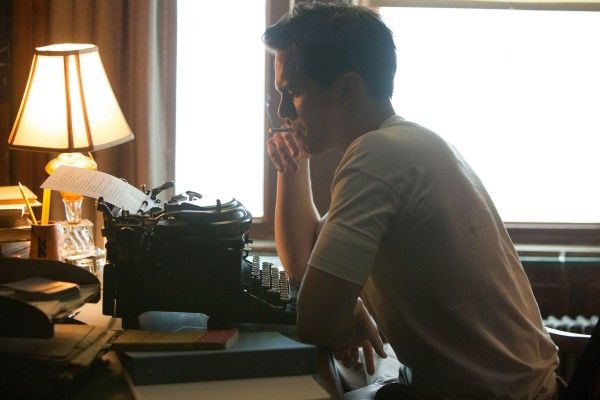The Catcher in the Rye is one of the greatest novels of all time. Its power is increased due to the mystique of its author J.D. Salinger, who only published two novels and a collection of short stories. Salinger was a recluse, and his reclusiveness only added to his mystique, thus lending Catcher even more power. Salinger became an enigmatic figure, and while Danny Strong’s Rebel in the Rye tries to illuminate Salinger’s life, instead it plays by all the standard biopic beats rather than taking chances and doing the author justice. Instead of demythologizing Salinger, Rebel in the Rye plays like a fan film rather than an honest examination of a complex figure.
Rebel in the Rye starts in 1939 and follows J.D. Salinger (Nicholas Hoult) as he decides to commit to writing. Although his father (Victor Garber) wants Salinger to pursue a career where there’s the possibility of an income, Salinger goes to Columbia where he finds a mentor in creative writing professor Whit Burnett (Kevin Spacey). As Salinger develops his talent and tries to find his voice, he comes across the unforgettable character Holden Caulfield. However, when Salinger goes to fight in World War II, the horrors he witnesses causes him to suffer from PTSD. He struggles to find a way back to writing, but when he’s finally able to complete The Catcher in the Rye, he’s unable to cope with the success it brings.
Strangely, Rebel in the Rye is at its most alive when it takes Salinger out of the equation and instead focuses on the euphoria of writing. Strong, who has found success in past years as a screenwriter, clearly feels a connection with this aspect of Salinger, and while there’s one too many shots of Salinger euphorically hitting the typewriter keys, at least it feels honest to the process of writing. It’s here where Strong clearly feels kinship with his subject, and it’s in these moments where Rebel in the Rye is at its best.
Unfortunately, Strong hews too closely to the standard biopic beats, and there’s no insight here that couldn’t be gleamed from Salinger’s Wikipedia page. Although Hoult gives a fine performance, there’s nothing complicated about Salinger or anything that makes us reconsider him. If anything, it feels like Strong is trying to reverse engineer Salinger from The Catcher in the Rye, assuming that Holden and Salinger are similar enough that they can be used interchangeably.
Rather than shining a light on J.D. Salinger, Rebel in the Rye unintentionally makes the case that the author is unknowable, and that perhaps we should respect his wishes to remain so. We’re never going to get a Catcher in the Rye movie, and that’s okay. Trying to do one through the lens of Salinger’s life, and especially playing it so safe, does a disservice to both the author and his novel.
Rating: C-
Rebel in the Rye does not currently have a release date.


